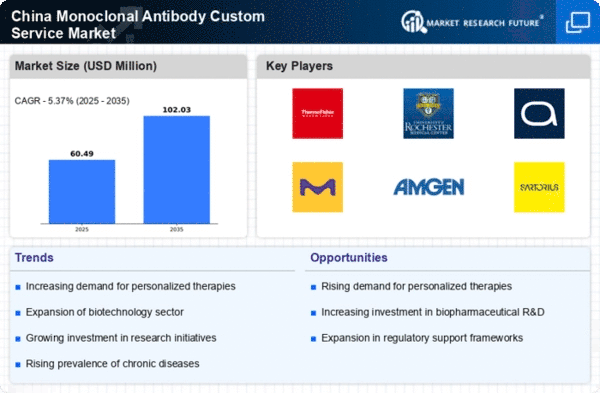Expansion of Research Institutions
China's monoclonal antibody-custom-service market is benefiting from the rapid expansion of research institutions dedicated to biotechnology and pharmaceuticals. The government has established numerous research centers and universities focused on advancing biopharmaceutical research. In 2023, the number of research institutions in the biotechnology sector increased by 20%, fostering collaboration between academia and industry. This environment encourages the development of novel monoclonal antibodies and custom services, as researchers seek to translate their findings into practical applications. The synergy between research institutions and the monoclonal antibody-custom-service market is likely to enhance innovation and drive growth in the coming years.
Rising Demand for Diagnostic Tools
The monoclonal antibody custom service market is propelled by the increasing demand for advanced diagnostic tools in China. As healthcare systems evolve, there is a growing emphasis on early detection and personalized treatment plans. Monoclonal antibodies play a crucial role in the development of diagnostic assays and imaging techniques. The market for diagnostic tools is expected to grow at a CAGR of 12% over the next five years, creating opportunities for custom monoclonal antibody services to cater to this demand. This trend indicates a shift towards more precise and effective healthcare solutions, further driving the monoclonal antibody-custom-service market.
Growing Prevalence of Chronic Diseases
The increasing incidence of chronic diseases in China is a significant driver for the monoclonal antibody-custom-service market. With conditions such as cancer, diabetes, and autoimmune disorders on the rise, there is a heightened need for targeted therapies. According to recent statistics, cancer cases in China are projected to exceed 4.5 million by 2025, necessitating the development of effective monoclonal antibody treatments. This trend is pushing healthcare providers and pharmaceutical companies to seek custom monoclonal antibody services to create tailored solutions for patients. As a result, the monoclonal antibody-custom-service market is likely to expand to meet the growing demand for innovative therapeutic options.
Increasing Investment in Biopharmaceuticals
The monoclonal antibody-custom-service market in China is experiencing a surge in investment from both public and private sectors. The Chinese government has prioritized biopharmaceuticals as a key area for development, allocating substantial funding to research and development initiatives. In 2023, investments in the biopharmaceutical sector reached approximately $10 billion, reflecting a growth of 15% from the previous year. This influx of capital is likely to enhance the capabilities of companies providing custom monoclonal antibody services, enabling them to innovate and expand their offerings. Furthermore, as the market matures, the demand for specialized services is expected to rise, driving further investment and development in the monoclonal antibody-custom-service market.
Strengthening Intellectual Property Protections
The enhancement of intellectual property protections in China is fostering a more favorable environment for the monoclonal antibody-custom-service market. Recent reforms have aimed to strengthen patent laws and enforcement, encouraging innovation and investment in biopharmaceuticals. Companies are more likely to invest in the development of custom monoclonal antibodies when they feel secure about their intellectual property rights. This legal framework not only protects innovations but also attracts foreign investment, which is crucial for the growth of the monoclonal antibody-custom-service market. As these protections continue to improve, the market is expected to see increased activity and expansion.
















